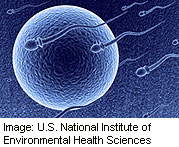
MONDAY, June 30, 2014 (HealthDay News) — A sperm donor’s age doesn’t affect the chances of a live birth resulting from fertility treatments using donor sperm, a new study says.
There is emerging evidence that sperm quality declines as men age. However, the new study’s findings support previous research showing that a couple’s chances of having children are much more dependent on the age of the female than of the male, researchers said.
The results also show that the quality of donor sperm — rather than the donor’s age — is the important factor in the success of fertility treatments, the study authors said.
“It’s sperm quality rather than male age that matters,” said principal investigator Dr. Meenakshi Choudhary, from the Newcastle Fertility Centre at Life, Newcastle upon Tyne, United Kingdom.
The researchers analyzed more than 39,000 first fertility treatment cycles with donated sperm that were performed in the United Kingdom between 1991 and 2012. The treatment included either in-vitro fertilization (IVF) or donor insemination.
The live birth rate from IVF was about 29 percent among women ages 18 to 34 and about 14 percent among women over age 37. However, there was no link between the live birth rates in these two age groups and the age of the sperm donors.
Similar findings were made for donor insemination, according to the study that’s to be presented this week at the annual meeting of the European Society of Human Reproduction and Embryology, in Munich, Germany. Research presented at meetings are generally considered preliminary until published in a peer-reviewed journal.
“Our results suggest that, up to the age of 45, there is little effect of male age on treatment outcome, but sperm donors are a selected population based on good sperm quality,” Choudhary said in a society news release.
“Our study shows that we are good at selecting the right sperm donors with the right sperm quality — and that’s why we found no difference in live birth rate despite the increasing age of sperm donors. This confirms the view that a man’s age doesn’t matter in achieving a live birth provided his sperm quality is good,” she said.
More information
The U.S. National Institute of Human Health and Child Development has more about infertility treatments.
Copyright © 2024 HealthDay. All rights reserved.

